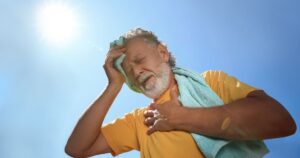As High Temps Sweep the Nation, Remember Heat Safety
July 17, 2024Last summer was the hottest recorded summer in 2,000 years – and this summer has over a 60% chance of being even hotter. Millions of people in the tri-state area seek refuge from scorching temperatures at the beach or pool, cooling down along with family and friends. With plenty of the summer season still left ahead, it is a good idea to familiarize yourself with how to best (and most safely) handle the extreme heat.
How Do You Get Sick From the Heat?
If you are wondering what exactly “extreme” heat is, here is the simple answer: it is when temperatures are much higher — or much more humid – than normal. According to the Centers for Disease Control and Prevention (CDC), heat-related illnesses have been on the rise in the United States. This is not a big surprise, especially when we consider just how high temperatures have been for the last few years. Heat-related illnesses occur when the body is unable to cool itself down, compromising its ability to properly regulate temperature. They can also result from dehydration through sweating.
Certain people face higher risks for sustaining heat-related illnesses, such as people with certain medical conditions, children, and older individuals. Doctors warn that children face especially high heat-related risks; they are prone to heating up quickly, they lack the ability to cool down properly. This is because their systems are still developing as they grow. For example, young children sweat less than adults. They are also less mindful of hydrating, which is why parents or caregivers should remember to push adequate fluids. The CDC says other factors contribute to the likelihood of developing heat-related illnesses too, like alcohol use, sunburn, obesity, high levels of humidity, heart disease, prescription drug use, poor circulation, and fever.
Examples of Heat-Related Illnesses
People can experience a wide range of heat-related illnesses. Some are more mild inconveniences, and others are deadly. The following are different types of heat-related illnesses:
- Mild heat illnesses include heat rash, muscle cramps, swelling in the hands and/or feet, and heat syncope, or a fainting episode that occurs after getting up suddenly or standing too long
- Rhabdomyolysis, which causes the rapid degeneration, rupture, and death of muscle. When muscle tissue dies, it causes electrolytes and large proteins to enter the bloodstream, which can lead to seizures, irregular heart rhythms, and kidney damage
- Heat exhaustion. Heat exhaustion is the body’s response to an excessive loss of salt and water. Heat exhaustion most commonly affects elderly individuals, people with high blood pressure, and those that work outdoors (though it can also affect others exposed to extreme heat)
- Heat stroke, or the most serious heat-related illness. When a person develops heat stroke, their body temperature rapidly rises, and they are unable to effectively cool down. In these instances, the body’s temperature can rise to 106 degrees or higher in just ten to fifteen minutes time. This illness has the capacity to cause permanent disability and/or death in the absence of emergency medical intervention
If you suspect someone is experiencing heat stroke, call 9-1-1 right away. Individuals who experience heat exhaustion and/or rhabdomyolysis should follow up with a trusted healthcare provider.
Important Heat Exposure Safety Tips
Whether you are lounging poolside or enjoying the ocean’s waves, taking precautions to prevent yourself from developing a heat-related illness is no laughing matter. In 2022, a record-breaking number of Americans lost their lives to heat-related illnesses. Altogether, there were 2,302 fatalities. Luckily, there are several simple things we can all do to stay safe and avoid dangerous levels of exposure. Here are some essential recommendations from the CDC:
- Try your best to stay cool by wearing appropriate clothing (think loose-fitting and lightweight)
- When you are indoors, stay in an air-conditioned area as much as you can. If your home does not have air conditioning, go to the library or mall. Even taking a few hours in air conditioning can help your body stay cooler when you return to the heat. You can also use your oven and stove less to keep your space cooler
- If possible, take a cool shower or bath to cool down
- Never leave a child or anyone else in cars, which can quickly reach deadly temperatures – even if it is not that hot outside
- Schedule your outdoor activities conscientiously. Try to partake in outside activities during the coolest hours, like early morning and evening
- Take frequent breaks in shady areas to give your body a chance to rest
- Pace yourself! Cut down on exercising in extreme temperatures
- Remember to wear sunscreen
- Avoid hot and heavy meals, which can make you even hotter
- Prioritize staying hydrated. Drink plenty of fluids, regardless of your activity level
- Check up on people who are high risk, like infants and small children, older individuals, people with certain medical conditions, etc.
Philadelphia Personal Injury Lawyers at Galfand Berger, LLP, Representing Injured Victims Since 1947
If you have questions about filing a claim for injuries you sustained, contact the Philadelphia personal injury attorneys at Galfand Berger LLP today. Call us at 800-222-USWA (8792) or fill out our online form for a free consultation. Located in Philadelphia, Bethlehem, Lancaster, and Reading, we serve clients throughout New Jersey and Pennsylvania, including Allentown and Harrisburg.
 Google Screened
Google Screened
